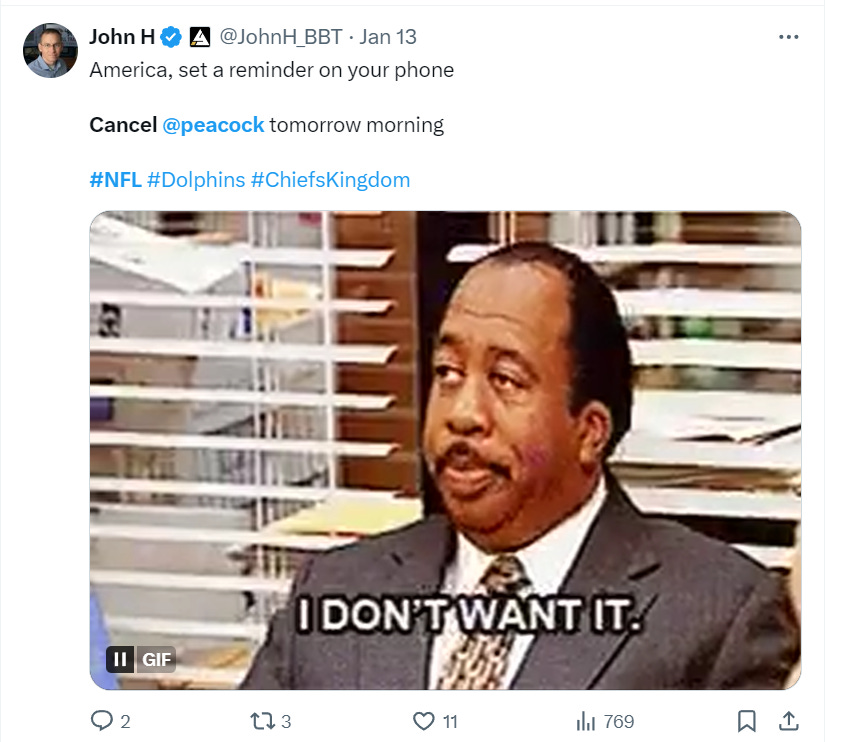Peacock, NFL and Streaming's Dangerous Double Standard
How trashing legacy studios for the same strategic moves as their tech rivals warps the competitive landscape in Silicon Valley's favor
The Entertainment Strategy Guy writes for The Ankler every two weeks. Subscribe to his standalone newsletter to unlock access to all of his weekly streaming ratings reports, detailed charts, and more.
Back in January, everyone had a pretty funny joke regarding Peacock and its audacious plan to stream an NFL Wildcard football game exclusively on its service:
I can’t wait to see how many folks cancel their streaming subscription to Peacock on Monday!
I saw sooooooo many pundits, professional and amateur, deploying GIFs and tweets to make that same joke/point.
That’s what made the latest report from the analytics company Antenna so fascinating: It found that a whopping 71 percent of customers who signed up for the game stayed subscribed seven weeks later. Remember, Peacock saw a huge spike of customers that weekend (as did Paramount+ for the Super Bowl):
And it looks like most of them stuck around!
Now, two months of paying for Peacock for approximately 2.1 million customers doesn’t pay for this NFL Wildcard game. (Rumors are Peacock paid in the very low nine figures for these rights.) But if you factor in the buzz, awareness and customer retention, you can make an argument this was a smart play for Peacock. For example, it helped propel The Office into the Nielsen top 10 for the first time since it left Netflix.
Indeed, way back when Amazon first bought Thursday Night Football games in 2021, for even more money, most of the commentariat praised the move. Same for Google’s 2022 purchase of NFL Sunday Ticket rights, even though folks including Sean McNulty have pointed out that, at least in its first year, Google likely lost money.
Which is . . . odd, isn’t it? Everyone made fun of Peacock for buying NFL rights, then praised Google and Amazon for doing the exact same thing. After Peacock’s success, Prime Video quickly bought back the rights to the NFL Wildcard playoff game, and it seemed like everyone was back to praising Amazon for its smart digital media strategy.
Then on Tuesday, Peacock secured another streaming-exclusive game as part of NFL’s opening weekend this fall, and the cycle of making fun of it started again.
This may just be my read on the “discourse” in the entertainment business strategy world — of which I’m absolutely a part — but it seems like it often boils down to this:
If Big Tech (Amazon, Apple, Google and Netflix) does something, it’s brilliant.
If Traditional Entertainment (Disney, Warner Bros. Discovery, Paramount Global and NBCUniversal) does the same thing, it’s horrible.
In other words, “Heads big tech wins, tails traditional entertainment loses.”
Frankly, this type of analysis bothers me. Good strategy is good strategy. I believe this to my core. More importantly, if you don’t want to be surprised in this town, you have to know what’s actually working and what’s not. As we’ve seen since 2019, following the media hype (especially new tech hype) or the whims of Wall Street can lead you astray.
So that’s what we’re going to talk about today. It’s crucially important to understand the difference between “good strategy” and a “good situation.” Plus, I’ll provide some of my favorite instances of folks treating big tech differently from traditional entertainment. Here’s what you’ll learn in this issue:
The huge streaming TV and film bombs overlooked by media
Five examples of the double standard that advantages Big Tech at the expense of its traditional media rivals
The consequences of a broken narrative for legacy players, including Paramount and WBD
Why infinite spending by the tech companies is a myth
The problem with conflating having money and value creation
The most expensive flop of the year . . . and it wasn’t in theaters
The sport which grew ratings more than Formula 1 . . . without Netflix
How our rage at monopolists misses the biggest players





